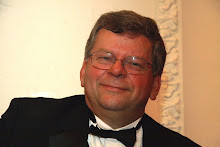
In Canada we are approaching Thanksgiving weekend, and the weather gods have granted us a preview of the inevitable fate we in Edmonton encounter every year, an early snow. Not much; just enough to force one to reluctantly haul out the faux-sheepskin jacket and faux-leather winter gloves, and wield a snow shovel behind the garage. Tonight happened also to be my first rehearsal night with our university orchestra on a Haydn Creation project (celebrating, with many other choirs, the 200th anniversary of his death). The concert is exactly one month from today in our gorgeous Winspear Concert Hall in downtown Edmonton. The players are doing well, but I was reminded about how many damned notes there are in that piece, and a lot of them in difficult passages! Especially for the violins. Our choirs have been hard at it for over a month now, and despite the classic struggles with the German text (in the Pilkington/Novello edition where it is written below the English text, quite far from the notes), they are already making the occasional unified joyful noise. And all the while, celebrating the exuberant beauty and freshness of Papa Haydn at his very best.
As so often in our lives, these moments of ecstasy in the midst of music making with master pieces (this one describing new life in all its beauty) are often tinged with the sadness of having to watch the passing of dear friends and acquaintances. The past few days and weeks have been particularly difficult, with the loss of several close acquaintances whose lives and talents I had the good fortune to intersect with and benefit from as a conductor. I want to write about two of them.
Gordon Morash, a journalist who had uncommon gifts as a writer of non-fiction, and especially so when it came to writing columns about his favourite pastimes, books, good food, wine and single malt, was also a passionate and devoted bass in my symphonic choir for nearly two decades. Having grown up in the counter-culture era of Edmonton in the 1960s and 70s, he had honed his craft as a singer in various rock and folk bands, but later in life his passions turned to great solo vocal and choral music. You have all met such singers in your choirs before - the kind who will take the time to bring you a favourite column or article from the New Yorker or The NY Times on some topic related to the work we are studying; the kind who will take the time to write you after a successful rehearsal or concert, and eloquently state their case for having been transported in the moment. Two years ago we learned of his initial diagnosis with abdominal cancer, and his friends in the choir shared both the highs and lows of his epic struggle. My last visit with Gordon came at his re-audition in early June, in which he sang Handel's "Where e'er you walk" (poignant choice, in retrospect), and he looked absolutely fabulous (and sounded great too!) Having been away for much of the summer, I did not have any further contact with him until I heard the shocking news of his rapid decline and death, all within a few days in late August. We celebrated his life and many loves a few weeks later with choruses from Elijah and Ein deutsches Requiem, two of his favourite choral works. At our first rehearsal after his passing, some friends in the choir left an open chair with a copy of the Verdi Requiem (which we open our season with) on it and Gordon's name taped to the chair. He is greatly missed.
Tonight I am further saddened by the loss of a former tenor in my choir, Richard Horch, also to cancer. Richard and I also go back a long ways; even before he was a member of our choir, I had gotten to know him and his dear wife Betty through the local Mennonite congregation I was attending at the time. An organist and outstanding tenor, Richard was one of those indomitable spirits who insisted on finding positives in every situation, and I am forever grateful to him and Betty for their generous caregiving as friends in some rather dark and difficult times. This summer I did have an opportunity to visit him at his home in Abbotsford BC where he had retired a number of years ago, at a time when it was already clear that he would not be long with us. We sat for over an hour listening to a range of choral and organ recordings that his daughter Ruth played. We reminisced about some of his favourite choral experiences with our choir - St. Matthew Passion and the Missa Solemnis, amongst others. We laughed about shared memories. He died peacefully this evening. Rest in peace, my dear friend. This will be a Thanksgiving with a slightly different hue.

